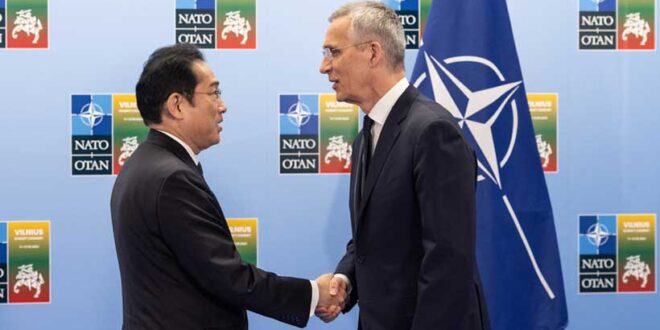China’s reaction to the Camp David summit in Washington between South Korea, Japan and American officials was angry, and many angry reactions by China appeared on it. Where the Camp David summit comes as a pillar to provide the basis for an American nuclear deterrent force with its allies against the Chinese or North Korean threat according to its general context, with a US-Japanese-South Korean approach to an alliance with strategic guarantees, an attack on one of its parties constitutes an attack on the rest, making it closer to The NATO Asian project is being announced.
But China believes that there are limits to what this summit can achieve at Camp David, as they consider that South Korea will remain reluctant to confront China, as it is China’s largest trading partner. On the other hand, South Korea’s growing concern about Chinese influence may create room for greater trilateral cooperation in dealing with the threat from Beijing.
On the other hand, China has a different view to resolving conflicts, as China is trying to adopt a number of new developmental, economic and diplomatic initiatives within the framework of its Belt and Road initiative during the era of President Xi Jinping in the Asian region, with the aim of besieging and restricting US influence in that region, With the Chinese emphasis on its right to sovereignty over the disputed maritime areas in the South China Sea in the face of Japan and South Korea, it therefore conducted major maneuvers near the Taiwan Strait to confirm its control over its regional spheres of influence. Therefore, the first practical reaction came from China in response to the Camp David summit through its foreign minister Wang Yi, describing Japan and South Korea as “it is more appropriate for those two economically advanced democracies in the Northeast Asian region to work with Beijing to revive East Asia instead of Forging new alliances to stir up tension and anxiety in the world”.
The Chinese emphasis also comes on the belief of the Chinese that there is no winner in conflicts and there is no loser in any peace process. Accordingly, on April 24, 2022, President Xi Jinping launched the “Global Security Initiative”, to serve as an innovative Chinese solution to global security dilemmas. China’s comprehensive diplomatic role of “building the community of common future for mankind”. China also affirms, through its global Belt and Road initiative, that there is no security in the world without security, and there is no security for people without world security. Therefore, China plays actively and plays its role as a major country in applying the new concept of joint, integrated, cooperative and sustainable security to find a political solution to hot issues.
China criticized the agreement of the presidents of America, Japan and South Korea to agree to conduct annual military exercises, and China criticized that, and considered that it achieves security at the expense of others. Especially with US President Biden confirming that the level of defense cooperation between the three countries has been raised “in an unprecedented manner, including launching multi-mission maneuvers on an annual basis, redoubling efforts to exchange information about North Korea’s missile tests, and strengthening defense cooperation at the level of ballistic weapons”.
In Beijing, Foreign Ministry spokesman Wang Wenbin called for not turning the Asia-Pacific region into an arena of geopolitical competition. He said – in his comment on the tripartite summit at Camp David – that the attempt to mobilize the circles and create military blocs will certainly arouse the vigilance and opposition of the countries of the region, as he put it. Before the summit, US National Security Adviser Jake Sullivan made sure that this enhanced trilateral cooperation is not tantamount to “Atlantic NATO in the Pacific”. Here, Sullivan announced that the leaders of the United States, Japan and South Korea will agree during the summit to conduct annual joint military exercises, and will undertake to consult with each other in the event of crises.
US President Joe Biden and Japanese Prime Minister Fumio Kishida said, at a meeting at Camp David Resort, that the two sides have made great progress in developing the defense partnership between Washington and Tokyo, and agreed to jointly develop anti-missile, to intercept ultrasonic weapons. Beijing’s resistance to Washington’s attempts to establish military blocs, as the Chinese Ministry of Foreign Affairs issued a statement by the spokesman Wang Wenbin, in a press statement, that no country should seek its security at the expense of the security interests of other countries, as well as regional peace and stability, while the embassy indicated Chinese to the United States, that China intends to resist American attempts to establish military blocs in the Asia-Pacific region, whereas “no country should pursue its own security at the expense of other countries’ security interests, as well as regional peace and stability”, said Chinese Foreign Ministry spokesman Wang Wenbin, at a press briefing. He stressed that “in a world dominated by change and turmoil on the security front, all parties must act on the basis of the vision of a community of common security for mankind, practice true pluralism, and jointly address various security challenges”. The three leaders Biden, the Japanese Prime Minister Fumio Kishida and the South Korean President Yon Sok Yul, announced their intention to hold massive military exercises annually.
The three heads of state affirmed, in a joint statement, their openness to dialogue with North Korea without preconditions. The joint statement referred to the holding of tripartite meetings with the participation of leaders, foreign and defense ministers and national security advisers of the three countries, at least once a year, to complement the existing tripartite meetings between representatives of the Ministries of Foreign Affairs and Defense. While the US Secretary of Defense, Lloyd Austin, commented on the tripartite summit in Camp David, that the summit reaffirmed that cooperation between the three countries provides security and prosperity for the peoples, the Indo-Pacific region and the world, adding that today is a historic day for the United States and the two closest allies to Washington.
This is what the US Secretary of Defense Austin considered, aims to advance a new era of tripartite partnership with Japan and South Korea under the leadership of (Biden, Kishida and Yul), and the US Secretary of Defense confirmed that the agreements concluded by her country, Japan and South Korea, will strengthen commitments Joint challenges to meet the challenges, by adhering to a multi-year tripartite framework that includes mutual evaluation of North Korea’s missile launches and taking advantage of the current secure lines of communication and multi-field annual tripartite exercises, which angered China for fear of establishing a “NATO-Asian alliance” similar to the North Atlantic Treaty Organization led by the United States of America.
 Geostrategic Media Political Commentary, Analysis, Security, Defense
Geostrategic Media Political Commentary, Analysis, Security, Defense





